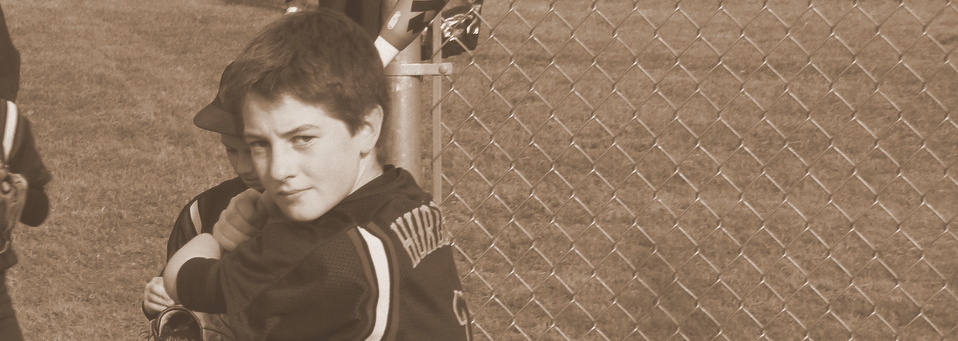
Julia and Gerald Hurlburt found out via an ultrasound that their son Alex would be born without a left arm.
“It was very difficult to understand why this happened to our son. Would he be able to make friends? How will he fit in at school? Many thoughts came to me relating to a young kid’s self esteem. It just didn’t seem fair to our little boy,” said Julia.
Alex is now in the fifth grade at Brush College Elementary School in Salem, Oregon. He plays sports without acknowledgment of his missing arm, but things didn’t start out so easy.
Kids would stare, tease, and point at him, he didn’t respond to the negative attention—he was shy. He kept everything inside and was very quiet in the evenings. As he grew older he was determined to prove that he was just as normal as anyone. Alex became a self-motivated kid, tackling obstacles that came his way.
His parents were there to support him every step of the way. When he wanted to learn how to ride a bike, his dad built an extension on one of the handlebars—making it easier for him to adjust. Clothing was never a problem—long-sleeve shirts were always altered.
How many people can tie their shoe with one hand? Not many, but Alex can.
He discovered and overcame many challenges at school—climbing a rope, jump-roping, shooting a basketball, plus other activities. His P.E. teacher, Loni Espinoza, said, “He is one of my most athletic kids, he never complains—always finds a way to adapt.”
His parents keep him motivated by never mentioning “Can’t.” They expect his best effort, but at the same time remind him that he’ll have good days and bad days. They don’t expect him to be outstanding at everything, although Alex expects that of himself.
“If we could take back how worried we felt when Alex was born, we would in a second. The way things have turned out … we couldn’t be more proud. There aren’t too many things he can’t figure out how to do,” said his father.
Alex’s brother, Sean, is four years older. In the earlier years a few issues came up due to Alex getting so much attention. They are both competitive kids and have brotherly arguments from time to time. Despite that, Sean couldn’t be more supportive and proud of his little brother—they have a great relationship.
Alex currently plays for the West Salem JBO Titans, a competitive baseball team. He plays catcher and does an amazing job. He catches the baseball with his right hand as it comes zooming in, removes his mitt, tucks it under his short limb, grabs the baseball with his right hand, and throws it to the pitcher or a base. It’s like watching the gears on an automatic transmission. He does this faster than some kids can grab the ball from their own glove.
When he’s at bat his batting form and swing are precise; he hit a home run in a game last year.
Alex also plays football and basketball.
One of his coaches, Ron Juarez, said, “I’ve known Alex since his first-grade year. He’s a fearless competitor. He thinks he has two hands and doesn’t see it any different—it’s great to have him on our team.”
Gerald and Julia felt honored that another kid in Salem (with the same missing limb) was inspired by their son. Alex plans to keep in contact with him.
“Everything is going to be okay, kids adapt. They need a support system,” Julia said.
What goes through your mind when you see something difficult to master?
Alex: If I could possibly do that—why wouldn’t I try? I always wanted to play the trombone. I worked as hard as I could to hold it up—I realized it wasn’t going to work out. I didn’t let that keep me from playing an instrument. I switched to the baritone, which is a mini-tuba. I found a way to do what I like. I think about working harder each time until I find a way to accomplish that task.
What inspired you to start playing sports?
Vidal, he used to wrestle in Independence—he had a missing arm like me. My parents introduced him to me—I started meeting up with him regularly. I wrestled for two years. He gave me words of encouragement and helped me gain confidence to try sports. My dad’s endless hours teaching me about baseball—he gave me the assurance that I could play baseball if I worked hard at it. I’m so thankful for his support. And my mentor for years, Ron Juarez, he has shown me so many things throughout the years.
What is your favorite sport?
I would have to say baseball. I play catcher for my team and I love to hit the baseball. My friends on the team treat me very well. I also like football—I used to love to tackle my brother all the time, and he was a lot bigger than me. I also like to play basketball—definitely challenging but a lot of fun.
Is it a challenge for you to be socially involved with other kids?
In my younger days, kids would make fun of me. They would say all kinds of things and they’d stare at me. I would only meet with a few friends at a time. It was easier for me. And then my parents enrolled me in a daycare that had a large group of kids, little and big. It started getting easier for me as I got to know more kids. They became my friends.
How have your parents been supportive?
My dad got me started on playing baseball. He does so many things for me. He’s always trying to help me build my muscles up. It’s always a challenge building up the shoulder muscle where I don’t have an arm. He’s always there for me when I need something. My mom has taken so much time off of work to be there for me. It’s important to her that I get every opportunity to do the things I want to do. If there are any educational tools or pieces of equipment I might need, she’s there for me. Mom makes me clean my room to teach me clean habits. Both my parents help me with my school work if I need it. I also want to include my brother, he has been a huge help as well. They are all very supportive.
What has been the toughest task that you’ve achieved?
When I see myself starting to learn how to play baseball, and where I’m at today, I would have to say that learning how to play baseball has been the toughest task to achieve. Getting to know people was another tough one for me.
If there’s something you could say to other kids like you, what would it be?
No matter what you do, don’t stop. Learn to do stuff that you like and don’t stop trying—keep working harder and harder until you succeed. Don’t be afraid to try things. A kid once told me, “You can’t climb this fence.” When he saw me climb the fence, I gained his respect and we became friends. He never told me I couldn’t do anything again.
What is your goal in life, what do you want to be when you grow up?
My parents have set such a great example for me. They both have good jobs. Dad’s a service manager and Mom’s a parole officer. But I want to play college baseball and then become a professional baseball player. If that doesn’t work out, I would like to work in the sports medicine area. I want to be able to help people in the sports world.
(Learn more about author David Espinoza by visiting his website.)

